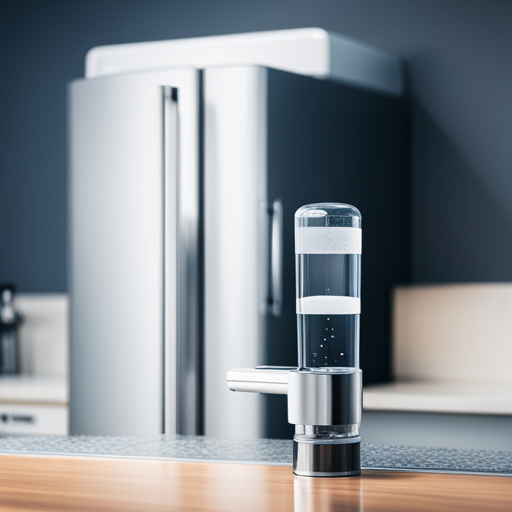Do you want to ensure that the drinking water from your refrigerator is clean and safe for consumption? If so, then refrigerator water filters are essential for you. These filters come in various shapes and sizes and are typically NSF 42 certified to eliminate pollutants and contaminants from your drinking water.
With proper maintenance and replacement every six months, they can significantly improve the quality of water you consume. You might be wondering, what are the benefits of using refrigerator filters? Not only do they make your drinking water safe and healthy, but they also save you money and reduce plastic waste.
Instead of buying bottled water, you can have clean water straight from your refrigerator without harming the environment. In this article, we’ll provide you with the ultimate guide to refrigerator filters, including their types, certifications, and maintenance tips to help you find the best one for your refrigerator.
Key Takeaways
– Refrigerator water filters provide clean water for drinking and ice making by filtering and eliminating various contaminants and pollutants.
– These filters require routine maintenance and replacement every 6 months to ensure effectiveness and prevent the buildup of bacteria.
– NSF certifications indicate the filtration capacity of the filters, with NSF 401 certification filtering the highest number of impurities.
– While dedicated water filter systems with reverse osmosis technology provide completely pure water, compatible filters from reputable companies can be a good option for refrigerator water filtration.
Filter Basics
If you’re looking to ensure clean water for drinking and ice making, refrigerator water filters are basic carbon filters that purify water and come in various sizes and shapes to fit different refrigerator models.
There are different types of filters available, including the basic carbon filter, which is the most common type found in refrigerators. These filters work by trapping impurities like sediment, chlorine, and other chemicals that can affect the taste and quality of your water.
Common contaminants that refrigerator water filters can eliminate include lead, chlorine, cysts, and other impurities that can affect the taste and smell of your water. These filters are typically NSF 42 certified, which means they meet certain industry standards for water filtration.
While they are effective at removing many contaminants, they cannot eliminate all pollutants, like lead and chromium-6, so it’s important to regularly change your filter to ensure its effectiveness. By doing so, you can enjoy clean and safe drinking water without worrying about harmful contaminants.
Certifications and Standards
When choosing a refrigerator filter, look for NSF certifications and standards to ensure that it effectively removes contaminants and pollutants from your drinking and ice-making water. The NSF certifications indicate the filtration capacity of the filter and ensure that it meets water safety standards.
The NSF 42 certification ensures that the filter reduces chlorine, taste, and odor, while the NSF 53 certification eliminates impurities like chlorine, manganese, sulfide, zinc, and heavy metals. If you want to ensure that your refrigerator filter removes even more contaminants, look for the NSF 401 certification which filters everything that NSF 42 and NSF 53 filters can, and some more.
This certification is particularly important if you live in an area with extreme water pollution. Dedicated water filter systems with NSF 58 certification and reverse osmosis technology provide completely pure water. Remember to always choose a compatible filter and replace it every six months to maintain its effectiveness.
Choosing and Maintaining Filters
To ensure the effectiveness of your filter, it’s important to regularly maintain and replace it every six months. Over time, filters become clogged with impurities and can no longer adequately filter your water, impacting both the color and flow of your water.
Indicator lights in many refrigerators can help you keep track of when it’s time to change your filter, but it’s important to be aware of other signs that your filter may need replacing. These signs include a decrease in water pressure or a change in taste or odor.
If you’re experiencing issues with your filter, there are a few troubleshooting steps you can take. First, make sure your filter is properly installed and compatible with your refrigerator model. If you’re having trouble with water flow, it may be due to a clogged filter, so try replacing it with a new one.
If you’re still having issues, it’s important to consult the manufacturer’s instructions or seek expert help to ensure that your filter is properly functioning and providing you with clean and safe drinking water.
Conclusion
Congratulations! You’ve just completed the ultimate guide to refrigerator filters. By now, you should have a good understanding of the benefits, types, and certifications of these essential filters.
With the right filter, you can enjoy clean and safe drinking water straight from your fridge. Remember to choose the right filter for your refrigerator model and replace it every six months to ensure its effectiveness.
Don’t forget to also maintain your filter regularly to keep it in good condition. By following these simple steps, you can ensure that your refrigerator filter continues to provide you with clean and refreshing drinking water.
So go ahead, take a sip, and enjoy the peace of mind that comes with having a reliable refrigerator filter.
